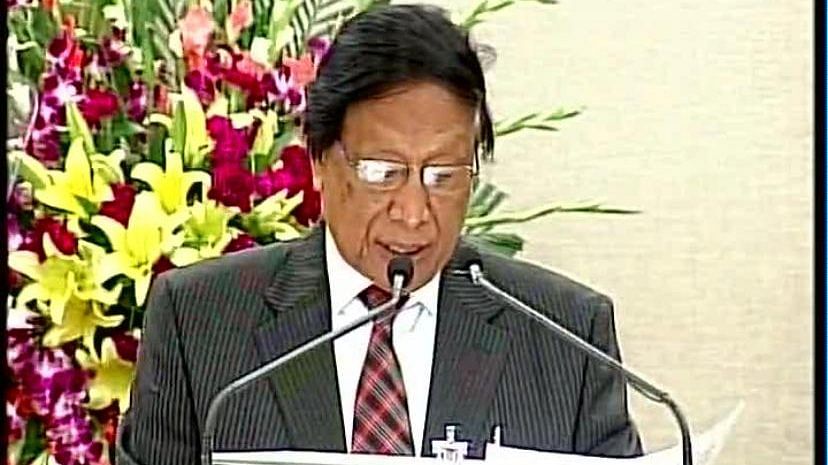New Delhi: National Socialist Council of Nagalim (Isak-Muivah) chief Thuingaleng Muivah Friday said the Naga people have “neither accepted the Union of India nor her Constitution at any point of time”, and will not do so in the days to come.
He was speaking on the occasion of the ‘Naga Independence Day’, at council headquarters at Hebron.
Muivah also referred to the Framework Agreement that the rebel group signed with the Narendra Modi government on 3 August 2015, and said the Centre had recognised the sovereignty of the Nagas.
“The Nagas will co-exist with India sharing sovereign powers as agreed in the Framework Agreement and defined in the competencies. But they will not merge with India,” he said.
The Framework Agreement, Muivah said, mentions “inclusive peaceful co-existence of the two entities sharing sovereign power”. ‘Inclusive’, he said, means all Nagas in different administrative units and political camps are to be included in the agreement.
“Co-existence of the two entities is self-explanatory. It means the two peoples and nations will co-exist,” he said. “Political and legal experts admit the terms ‘co-existence’ and ‘shared-sovereignty’ apply to two entities, not one entity.”
Muivah said even though the Nagas and Indians are “two poles apart in terms of history, race, identity, culture, language, geography, political concept and faith” and have nothing in common except security and commercial interests, both “must work out a common ground for a meeting point so that we may co-exist together as two entities”.
The NSCN(IM) is part of the Naga insurgency, which began in the early 20th century and was initially centred on the demand for a greater Nagaland or ‘Nagalim’ comprising the state and Naga-inhabited areas of Assam, Manipur, Arunachal Pradesh and Myanmar.
In the 2015 agreement, the NSCN(I-M) had agreed to give up its demands for sovereignty and settle for a solution that doesn’t require the state boundaries to be redrawn. It, however, later stuck to the demand for a separate flag and constitution for Nagaland.
Also read: We want peace but Governor Ravi is taking us back to fighting days, says NSCN (I-M)
‘We have our own flag and constitution’
Muivah Friday spoke of the separate flag and constitution for the Nagas, a demand which has not yet been accepted by the central government, and is a major contention between both parties.
He said whether India recognises it or not, the Nagas have their own flag and constitution. “Recognise them or not, we have our own flag and Constitution,” he said. “The flag and Constitution are ingredients of our recognised sovereign entity and the symbols of Naga nationhood. The Nagas must keep their flag and Constitution.”
Muivah also accused the Indian government of adopting a “the carrot and stick policy” and attempting “to hook the Naga issue through the deception of an autonomous Nagaland state within the Indian Constitution”. This, he added, was rejected by the Naga people knowing that it was nothing but political bait.
Recalling the Shillong Accord, Muivah said the Indian state, under its “scorched-earth policy”, tried to suppress the Naga national resistance movement and ultimately imposed the infamous Shillong Accord in 1975, which was condemned by the Naga national assembly.
“The Indian colonialism did not stop there,” Muivah said. “The Government of India through its intelligence agencies engineered Khaplang’s abortive political coup in 1988 where hundreds of Naga patriots were butchered.”
He added, “But by His grace, the Nagas survived again from the barbarous offensive campaigns of the collusion forces of India, Burma, Khaplang and other collaborators launched against them for a period of two decades.”
After 30 years of armed confrontations, Muivah said, the Indian military generals and political leaders accepted that military solution is not possible and realised the Naga problem is a political one that calls for a political solution.
‘Imposition of India’s will upon Nagas not acceptable’
Muivah said the Nagas’ political salvation lies in clinging to their national principle and saying no to the “dictation of the enemies”.
“Clinging to our principle, our people said no to the Union of India. They also said no to the 16-point agreement and the Shillong Accord that have made the issue alive thus far,” he said. “And they will say no to any agreement that betrays the national principle, and that imposition of Indian will upon the Nagas will never be acceptable to the Naga people.”
He, however, said the Nagas are for a political solution, which will balance their sovereign right and the security and commercial interests of India.
Also read: Moved by students’ forest trek for internet, Nagaland offers online lessons via pen drive
